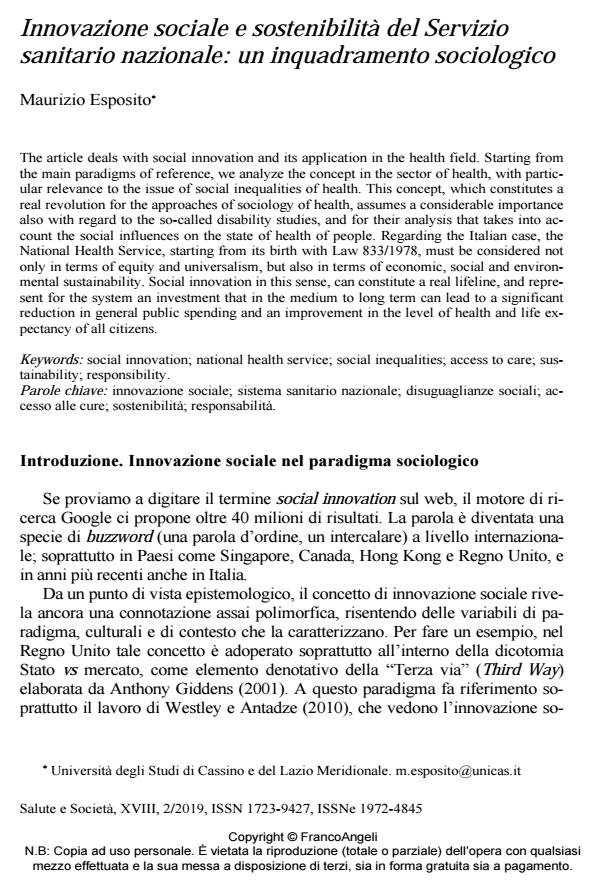Innovazione sociale e sostenibilità del Servizio sanitario nazionale: un inquadramento sociologico
Journal title SALUTE E SOCIETÀ
Author/s Maurizio Esposito
Publishing Year 2019 Issue 2019/2 Language Italian
Pages 10 P. 30-39 File size 224 KB
DOI 10.3280/SES2019-002004
DOI is like a bar code for intellectual property: to have more infomation
click here
Below, you can see the article first page
If you want to buy this article in PDF format, you can do it, following the instructions to buy download credits

FrancoAngeli is member of Publishers International Linking Association, Inc (PILA), a not-for-profit association which run the CrossRef service enabling links to and from online scholarly content.
The article deals with social innovation and its application in the health field. Starting from the main paradigms of reference, we analyze the concept in the sector of health, with particular relevance to the issue of social inequalities of health. This concept, which constitutes a real revolution for the approaches of sociology of health, assumes a considerable importance also with regard to the so-called disability studies, and for their analysis that takes into account the social influences on the state of health of people. Regarding the Italian case, the National Health Service, starting from its birth with Law 833/1978, must be considered not only in terms of equity and universalism, but also in terms of economic, social and environmental sustainability. Social innovation in this sense, can constitute a real lifeline, and represent for the system an investment that in the medium to long term can lead to a significant reduction in general public spending and an improvement in the level of health and life expectancy of all citizens.
Keywords: Social innovation; national health service; social inequalities; access to care; sustainability; responsibility.
- Bassi A. (2011). Social Innovation: Some Definitions. Boletín del Centro de Investigación de Economía y Sociedad, Barcelona, 88, marzo.
- Bates S. (2012). The Social Innovation Imperative. New York: McGraw-Hill.
- Dearden K.A. Marsh D.R., Schroeder D.G., Sternin J., Sternin M. (2004). The Power of Positive Deviance. British Medical Journal, 329: 1177-1179.
- Esposito M. (2013). Salute, malattie croniche e disuguaglianze sociali. Riflessioni sociologiche a partire dalle teorie della Social Selection e della Social Causation. In: Cipolla C., a cura di, Disuguaglianze sociali in Sanità. Milano: FrancoAngeli.
- European Commission (2013). Social Innovation research in the European Union. Brussels: European Commission.
- Fondazione GIMBE (2017). Secondo Rapporto sulla sostenibilità del Servizio Sanitario Nazionale. Roma.
- Giddens A. (2001). The global third way debate. Cambridge: Polity Press.
- Goldsmith S. et al. (2010). The Power of Social Innovation. San Francisco, CA: Wiley and Sons.
- Jankélévitch V. (1967). Le pardon. Paris: Aubier-Montaigne.
- Lampugnani D., Cappelletti P. (2016). Innovazione sociale e generatività sociale: quale trasformazione delle relazioni sociali? Impresa Sociale, 8: 4-14.
- Medeghini R., a cura di (2015). Norma e normalità nei Disability Studies. Riflessioni e analisi critica per ripensare la disabilità. Trento: Erickson.
- Mormiche P. (1993). Les disparités de recours aux soins. Economie et Statistique, 265(5): 45-52.
- Moulaert F. (2009). Social Innovation: Institutionally Embedded, Territorially (Re)Produced. In: MacCallum D., Moulaert F., Hillier J., Vicari Haddock S., a cura di, Social Innovation and Territorial Development. Farnham UK and Burlington: Ashgate.
- Mulgan G. (2006). The Process of Social Innovation. Innovations: Technology, Governance, Globalization, 1(2): 145-162.
- Mumford M.D. (2002). Social Innovation. Ten Cases from Benjamin Franklin. Creativity Research Journal, 14(2): 253-266. DOI: 10.1207/S15326934CRJ1402_1
- Murray R., Caulier-Grice J., Mulgan G. (2010). The Open Book of Social Innovation. The Young Foundation, Nesta.
- Nussbaumer J., Moulaert F. (2007). L’innovation sociale au coeur des débats publics et scientifiques. In: Klein, J.L., Harrisson D., a cura di, L’innovation sociale: Émergence et effets sur la transformation des sociétés, Montreal: Presses de l’Université du Québec.
- Osservatorio nazionale sulla salute nelle regioni italiane (2017). Rapporto Osservasalute 2016. Roma: Università Cattolica del Sacro Cuore.
- Phills J.A., Deiglmeier K., Miller D.T. (2008). Rediscovering social innovation. Stanford Social Innovation Review, Fall 2008.
- Schiavo R. (2015). Social Innovation as a Key Imperative in Global Health. Journal of Communication in Healthcare, 8(2): 87-89. DOI: 10.1179/1753806815Z.00000000011
- Social Innovation Generation (2014). Breaking Through: How Corporate Social Innovation Creates Business Opportunities. KPMG, LLP, Canada.
- Solar O., Irwin A. (2005). Towards a conceptual framework for analysis and action on the social determinants of health. Geneva: World Health Organization.
- Westley F., Antadze N. (2010). Making a Difference. Strategies for Scaling Social Innovation for Greater Impact. The Innovation Journal: The Public Sector Innovation Journal, 15(2).
- e-health and e-care: an application of actor network theory in social communication Esposito Maurizio, Sara Petroccia, in International Review of Sociology /2023 pp.39
DOI: 10.1080/03906701.2023.2187828
Maurizio Esposito, Innovazione sociale e sostenibilità del Servizio sanitario nazionale: un inquadramento sociologico in "SALUTE E SOCIETÀ" 2/2019, pp 30-39, DOI: 10.3280/SES2019-002004